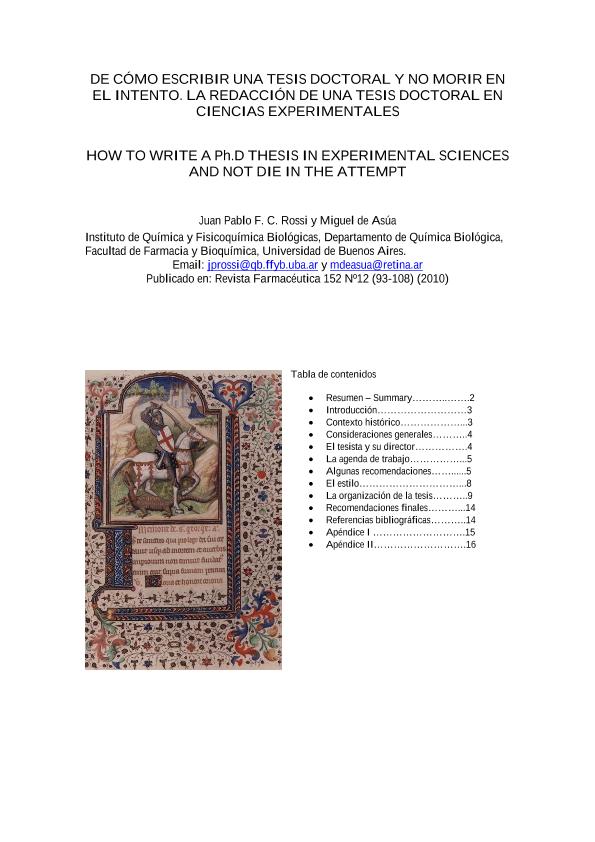Artículo
La tesis doctoral es el camino hacia el máximo grado académico otorgado por una universidad. En tanto tal, debe concebírsela como el corolario de un trabajo teórico o experimental original que demuestre la capacidad del doctorando de planificar y llevar a cabo un proyecto de investigación propio y de extraer del mismo las conclusiones pertinentes. En el curso de su trabajo, el o la tesista están guiados por un director o padrino (madrina) de tesis. El proceso culmina con la defensa de la tesis ante un jurado de especialistas, que basa su calificación en la lectura del manuscrito—por lo cual es fundamental que éste sea una versión pulida y agradable de leer. Toda tesis debería contribuir a la producción de nuevo conocimiento. Este requisito, que puede parecer tremendo, en realidad no lo es tanto. Generar conocimiento no es difícil. Lo que es muy arduo es obtener resultados nuevos que sean también significativos. Pero la tesis no requiere hallazgos que revolucionen un campo de investigación. Digamos de entrada que cualquier graduado motivado puede escribir una tesis original y, lo que es muy importante, con razonables posibilidades de ser aprobada. La peor actitud para acometer la tesis es dejarse intimidar por una hiper-autoexigencia destructiva. La tesis es una etapa más de una trayectoria académica y debe ser encarada con el fondo de un horizonte ideal, sí, pero de manera realista y con espíritu pragmático. Teniendo esto en cuenta y prestando atención a las sugerencias que proponemos, el trabajo de tesis puede incluso llegar a resultar una experiencia placentera. A doctoral dissertation is the way toward the highest academic degree granted by a university. As such, it should be conceived as the end result of an original experimental or theoretical work. The dissertation should demonstrate the aptitude of the graduate student to plan and conduct his/her own research project and his/her capacity for deriving from it the relevant conclusions. In the course of his work, the PhD candidate is guided by an advisor. The whole process culminates with the evaluation of the dissertation by two or three readers, who base their approval (or rejection) upon the reading of the manuscript—whereby it is of the utmost importance to present a wellwritten and stylistically correct text. Every thesis should contribute to the production of new knowledge. This requirement, which sounds intimidating, is actually not so hard to fulfill. The generation of new knowledge is not an unattainable goal. What is really difficult is to make a significant contribution to the existing body of knowledge. But a doctoral dissertation should not necessarily involve revolutionary findings in a given field. Any graduate student with enough motivation should be able to write a sound dissertation with fair chances of being accepted. When facing the writing of the doctoral thesis, the worst possible disposition is to indulge into a destructive hyper-self-demanding attitude. The thesis is just the first important step of a (hopefully) long academic career and should be faced realistically and with a pragmatic spirit. Taking this into account and heeding some of the recommendations listed below, the writing of the thesis could even turn into a pleasant experience.
De cómo escribir una tesis doctoral y no morir en el intento: la redacción de una tesis doctoral en ciencias experimentales
Título:
How to write a Ph.D thesis in experimental sciences and not die in the attempt
Fecha de publicación:
12/2010
Editorial:
Academia Nacional de Farmacia y Bioquímica
Revista:
Revista Farmacéutica
ISSN:
0034-9496
Idioma:
Español
Tipo de recurso:
Artículo publicado
Clasificación temática:
Resumen
Palabras clave:
Tesis Doctoral
,
Escritura
,
Ciencias Experimentales
Archivos asociados
Licencia
Identificadores
Colecciones
Articulos(IQUIFIB)
Articulos de INST.DE QUIMICA Y FISICO-QUIMICA BIOLOGICAS "PROF. ALEJANDRO C. PALADINI"
Articulos de INST.DE QUIMICA Y FISICO-QUIMICA BIOLOGICAS "PROF. ALEJANDRO C. PALADINI"
Citación
Rossi, Juan Pablo Francisco; de Asua, Miguel Jose Cristian; De cómo escribir una tesis doctoral y no morir en el intento: la redacción de una tesis doctoral en ciencias experimentales; Academia Nacional de Farmacia y Bioquímica; Revista Farmacéutica; 152; 12; 12-2010; 93-108
Compartir




